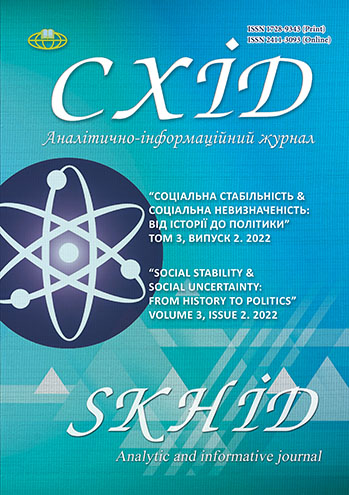Social cohesion and intercultural studies in the educational community
DOI:
https://doi.org/10.21847/1728-9343.2022.3(2).263601Keywords:
education, educational community, social cohesion, trust, university community, valuesAbstract
The article shows the important role of social cohesion as a social phenomenon, its impact on the development of society and intercultural communication. The social role of trust, in particular, in the development of social cohesion, is also shown. Social cohesion acquires acute relevance and importance in the current time of social transformations, as cohesion allows communities overcome various fluctuations and changes. The social cohesion as complex social phenomenon has been analyzed in the focus of intercultural studies. The aim of the research was to investigate the important spheres of social cohesion related to intercultural communication in the educational community, in particular, in the university community of National Pedagogical Dragomanov University. The research conducted several times, including the crisis states of society – pan-demic and war conflict in Ukraine. This research continues social cohesion studies, which are conducted in the National Pedagogical Dragomanov University since 2016, and demonstrates one of the current stages. The methodological tool is an adaptation of the "Social Cohesion Radar" model at the university community level. The study is based on primary data from the author's questionnaire. The important role of social cohesion, trust and values in intercultural communication is demonstrated.
Downloads
References
AlTaher, B.B. (2019). The necessity of teaching Intercultural Communication in higher education, Journal of Applied Research in Higher Education, 12 (3): 506-516. https://doi.org/10.1108/JARHE-04-2019-008
Bachtler, J. & Mendez, C. (2016). EU Cohesion Policy and European Integration: The Dynamics of EU Budget and Regional Policy Reform. London, Routledge. https://doi.org/10.4324/9781315580630
Bauman Z., Portera A., Mazzeo R. (2021). Education and Intercultural Identity. A Dialogue Between Zygmunt Bauman and Agostino Portera, First Published, 84 p.
Blum L. (2014) Three educational values for a multicultural society: Difference recognition, national cohesion and equality. Journal of Moral Education, 43:3, 332-344, https://doi.org./10.1080/03057240.2014.9227
Doktorova, D. (2014). Teoretychni Pidkhody do Rozuminnia Poniattia "Dovira" (Theoretical Approaches for the Understanding of the Conceptof "Trust"). Sotsiolohichni Studii, 1(4),50-62 (in Ukrainian)
Guttormsen, D. S. A. (2018). Advancing Otherness and Othering of the Cultural Other during “Intercultural Encounters” in Cross-Cultural Management Research. International Studies of Management & Organization, 48(3), 314-332. https://doi.org/10.1080/00208825.2018.1480874
Healy, M. (2018). Belonging, Social Cohesion and Fundamental British Values. British Journal of Educational Studies, https://doi.org/10.1080/00071005.2018.1506091
Lawrence, B. (2014). Three educational values for a multicultural society: Difference recognition, national cohesion and equality. Journal of Moral Education, 43(3): 332-344, https://doi.org./10.1080/03057240.2014.9227
Le, H., Polonsky, M., Arambewela, R. (2015). Social Inclusion Through Cultural Engagement Among Ethnic Communities. Journal of Hospitality Marketing & Management, 24(4), 375-400. https://doi.org/10.1080/19368623.2014.911714
Milani, M. (2019). Pedagogy and Intercultural Competence: Implications for Education. Encyclopaideia, 23(54), 93–108. https://doi.org/10.6092/issn.1825-8670/9494
Nesterova M., Dielini, M., Shynkaruk, L., Yatsenko, O. (2020). Trust as a cognitive base of social cohesion in the university communities. International Journal of Cognitive Research in Science, Engineering and Education (IJCRSEE), 8(1), 15-23. https://doi.org/doi: 10.5937/IJCRSEE2001015N
Nesterova, M., & Dielini, M., & Zamozhskyi, A. (2019). Social Cohesion in Education: Cognitive Research in the university community.
Nesterova, M., & Spulber, D. (2020). Values of trust and social cohesion in the modern socio-cultural space. Socio-Cultural Management Journal, 3(2), 122–137. https://doi.org/10.31866/2709-846x.2.2020.222650
Portera A. , Grant C.A. (ed.by) (2017). Intercultural Education and Competences. Challenges and Answers for the Global World, Newcastle upon Tyne. UK Cambridge Scholars Publishing.
Romani, L., Barmeyer. Ch., Primecz ,H., Pilhofer, K. (2018): Cross-Cultural Management Studies: State of the Field in the Four Research Paradigms. International Studies of Management & Organization, 48(3): 247-263. https://doi.org/10.1080/00208825.2018.1480918
Strandbrink, P. (2017). Cultural Pluralism and Social Cohesion. In: Civic Education and Liberal Democracy. In: Palgrave Studies in Global Citizenship Education and Democracy. Palgrave Macmillan, Cham. https://doi.org/10.1007/978-3-319-55798-4_3
Downloads
Published
How to Cite
Issue
Section
License
Copyright (c) 2022 Марина Дєліні, Агостіно Портера, Марья Нестерова, Марта Мілані

This work is licensed under a Creative Commons Attribution-NonCommercial-NoDerivatives 4.0 International License.
1. Authors bear responsibility for the accuracy of facts, quotations, numbers and names used.
2. Manuscripts are not sent back.
3. The publisher does not always agree with the authors' opinion.
4. The authors reserve the right to authorship of the work and pass the first publication right of this work to the journal under the terms of a Creative Commons Attribution-NonCommercial-NoDerivatives 4.0 International License. This license allows others to distribute (copy) the published work for non-commercial purposes, provided there is mandatory attribution to its authors and a link to the first publication in our journal.
5. The authors have the right to conclude separate supplement agreements that relate to non-exclusive work distribution in the form in which it has been published by the journal (for example, to upload the work to the online storage of the journal or publish it as part of a monograph), provided that the reference to the first publication of the work in this journal is included.

